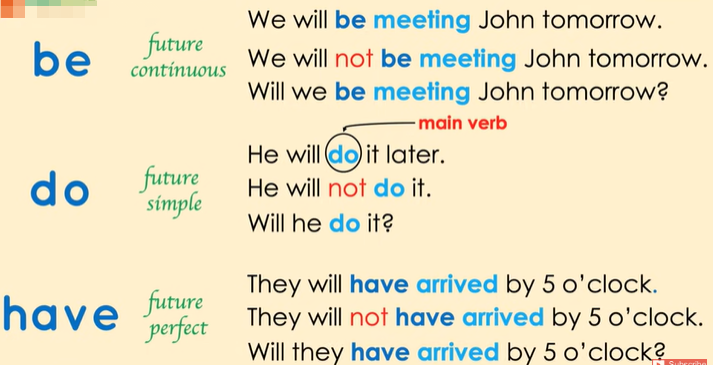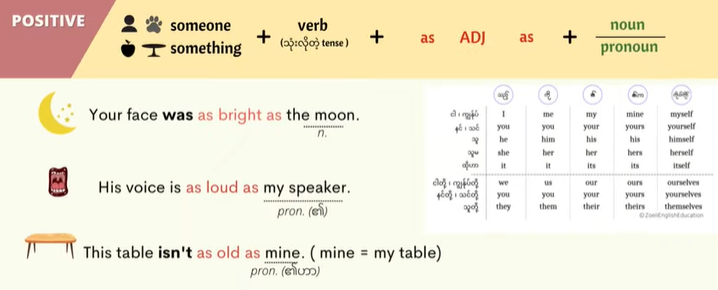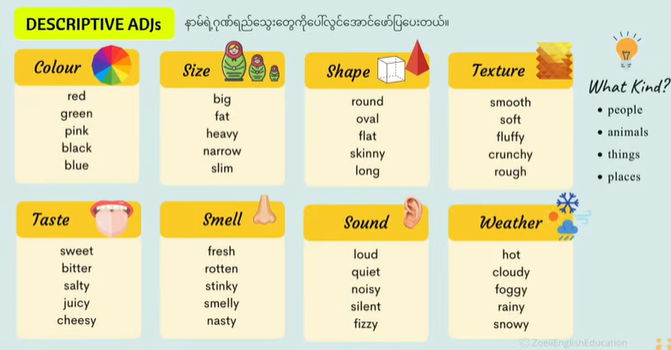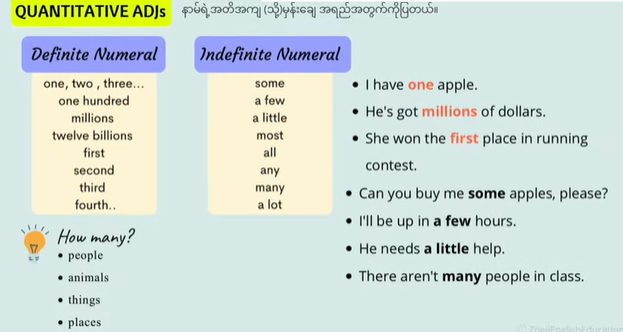Adverb Position
ယေဘုယျ အားဖြင့် (၃)နည်း
1. Front Position (ရှေ့ဆုံးနေရာ)
Eg : Suddenly the phone rang. (ရုတ်တရက် ဖုန်းဝင်လာတယ်)
Fortunately nobody was injured. (ကံကောင်းစွာနဲ့ ဘယ်သူမှ မထိခိုက်ဘူးး)
May be I'll go for a walk. (ငါလမ်းလျှောက်ထွက်ချင်ထွက်မယ်)
2. Mid Position(အလယ်နေရာ)
Eg : I always exercise before work.
She slowly began to recover from her illness.
3. End Position ( နောက်ဆုံးနေရာ)
Eg: You speak English well.
Please sit there.
They ate dinner quietly.
- adv အမျိုးအစားပေါ်မှာ မူတည်ပီး adverb position တွေကွဲသွားပါတယ်
Adverb of Manner
-အလယ်မှာ ထားလို့ရသလို ၊ နောက်ဆုံးမှာလည်း ထားလို့ရပါတယ်။
adverb of manner - အမူအရာပြကြိယာဝိသေသန
- quickly - မြန်ဆန်စွာ / မြန်မြန်
- slowly - နှေးကွေးစွာ / နှေးနှေး
- easily - လွယ်ကူစွာ / လွယ်လွယ်ကူကူ
- happily - ပျော်ရွင်စွာ / ပျော်ပျော်ရွှင်ရွှင်
- well - ကောင်းစွာ / ကောင်းကောင်းမွန်မွန်
- badly - ဆိုးရွားစွာ / ဆိုးဆိုးရွားရွား
- seriously - လေးနက်စွာ / လေးလေးနက်နက်
Eg : He quickly corrected his mistake. (mid position) (အမှားကို အဓိကထားပြော) He corrected his mistake quickly. (end position) (မြန်မြန်ကို အဓိကထားပြော)
She easily passed the test. (mid position) [pass ကို အဓိကထားပြော] She passed the test easily. (end position) [easily ကို အဓိကထားပြော]
* -ly နဲ့ဆုံးတာကို အလယ် or နောက်ဆုံးမှာ ထားလို့ရ , -ly နဲ့ မဆုံးတဲ့ adverb of manner (eg : fast , well , hard…) တွေကို နောက်ဆုံးမှာပဲ ထည့်လို့ရ
Adverb of time / Adverb of frequency
-ရှေ့ဆုံး or နောက်ဆုံးမှာထားလို့ရ
Eg : I study English every day. (end position)
Every day, I study English.(front position)
We visited Thailand last year. Last year , we visited Thailand.
* စကားလုံး နှစ်လုံးပါတာ(every day, every summer , next year,...)ဆို ရှေ့ or နောက်ဆုံးမှာ ထည့်လို့ရ
စကားလုံး တစ်လုံးထဲပါတဲ့ adverb(daily, weekly , monthly,...)တွေကို နောက်ဆုံးမှပဲထားရ
Eg : I speak with my mother daily.
Adverb of frequency => 1. adverb of definite frequency (ကြိမ်နှုန်းအတိအကျရှိသော adv)
2. adverb of indefinite frequency
Adverb of definite frequency (ကြိမ်နှုန်းအတိအကျရှိသော adverbs)
- စကားတစ်လုံးတည်းပါတာဆို end position မှာ ထား
- hourly - နာရီတိုင်း
- daily - နေ့စဥ် ၊ နေ့တိုင်း
- weekly - အပတ်စဥ်
- monthly - လစဥ်
- yearly - နှစ်စဥ်
- annually - နှစ်စဥ်
- biannually - 2နှစ်တစ်ခါ
- fortnightly -2ပတ်တစ်ခါ
- always - အမြဲတမ်း
- usually - အများအားဖြင့်
- never - ဘယ်တော့မှ
- often - မကြာခဏ
- very often - မကြာခဏ
- rarely - မလုပ်သလောက်(ရှားရှားပါးပါး)
- sometimes - တခါတလေ
- seldom - မလုပ်သလောက်(ရှားရှားပါးပါး)
- once in a while - တခါတလေ
- repeatedly - ထပ်ခါတလဲလဲ
- typically - အများအားဖြင့်
- hardly - မလုပ်သလောက် (ရှားရှားပါးပါး)
- hardly ever - မလုပ်သလောက်
- occasionally - တခါတလေ
- from time to time - တခါတလေ
- every now and then - တခါတလေ
- every so often - တခါတလေ
- every now and again - တခါတလေ
Eg : Usually I take the bus to work.
I usually take the bus to work.တချို့ adv တွေက ရှေ့ ၊ လယ် ၊ နောက် ထည့်လို့ရ
Eg : - occasionally - တခါတလေ ၊ ကြုံရင် ကြုံသလို
Occasionally we drink wine.
We occasionally drink wine.
We drink wine occasionally.
ဒီလောက်ပါပဲနော် လေ့လာရင်း တင်ပေးတာဆိုတော့ လိုအပ်ချက်များလည်းရှိပါတယ် ။ ဝေဖန် ထောက်ပြလို့ရပါတယ် ။ internet ပေါ််တွင် ပညာရှင်အသီးသီး blog အသီးသီးမှ လေ့လာထားတာကို မှတ်တမ်းအနေနဲ့ရော ၊ ကိုယ်လိုလေ့လာချင်သူတွေပါ အဆင်ပြေအောင် တင်ထားခြင်းဖြစ်ပါတယ်။ ကျေးဇူးအထူးတင်ပါတယ်။

























